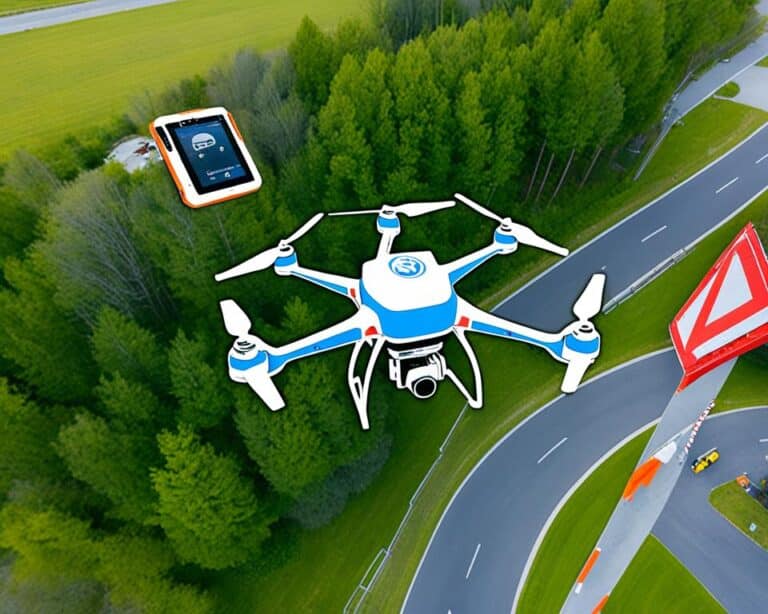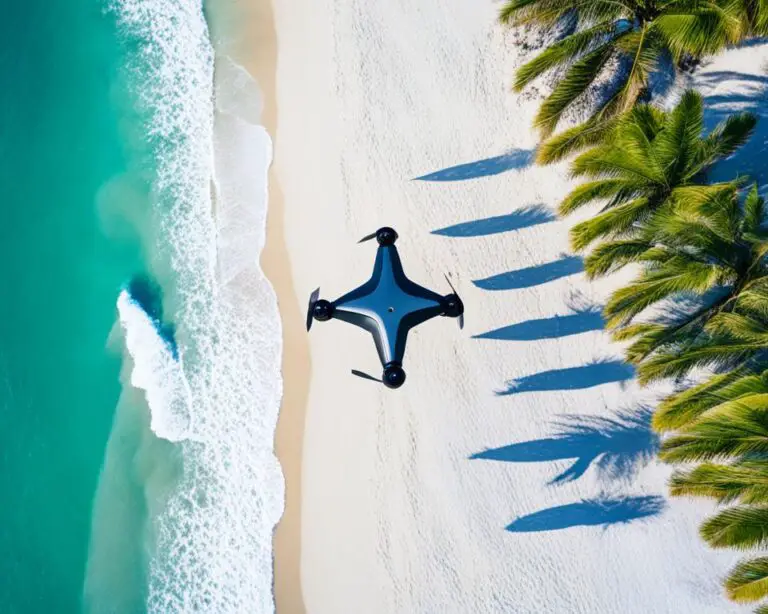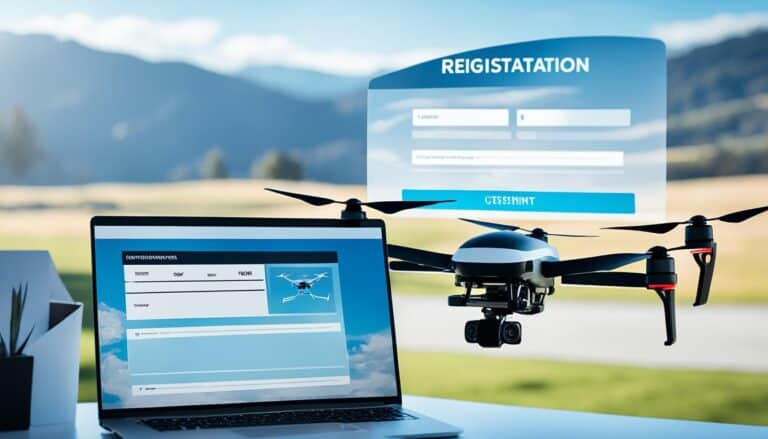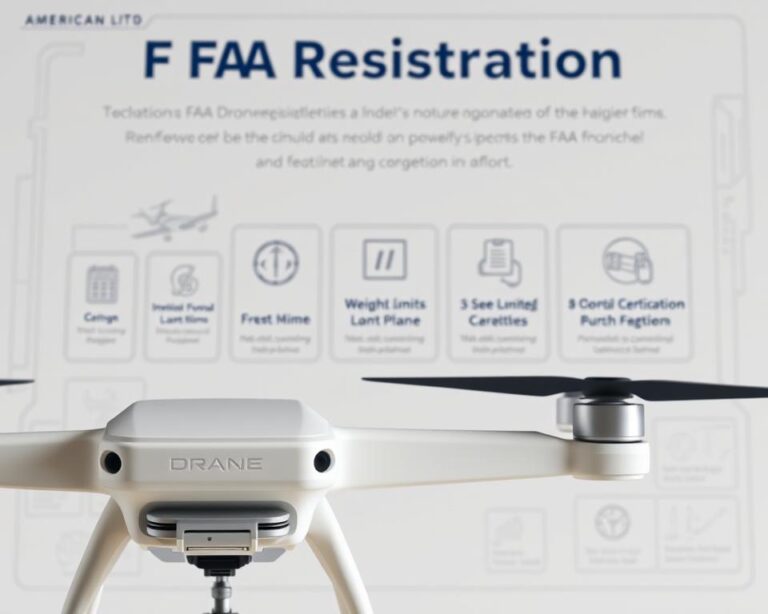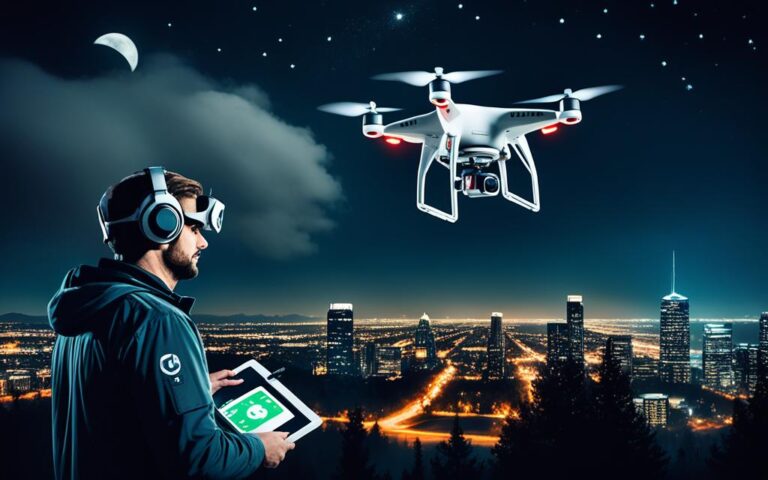Navigating Drone Flight Over Private Property Rules
As the skies buzz with the increasing popularity of drones, understanding the complexities of drone privacy laws becomes essential for both the enthusiasts and the skeptics. The United States has seen a significant rise in the use of Unmanned Aerial Vehicles (UAVs), prompting a closer examination of UAV regulations to balance innovation with individual rights. In this landscape, avoiding drone trespassing is not only a matter of etiquette but also a legal necessity. Property owner rights need to be respected to uphold the principles of privacy and personal space.
For pilots, responsible drone usage implies an awareness of the legal boundaries and a commitment to conscientious flight conduct. With the increasing capabilities of UAVs, pilots must navigate a patchwork of rules that aim to protect the privacy and property rights of individuals, while still allowing the freedom to pursue the passion for drones. It raises the critical question: How can drone operators ensure they’re flying legally and ethically over private property?
Join us as we explore the regulations and best practices surrounding this modern-day conundrum of technology intersecting with traditional property rights, ensuring that your enjoyment of drones doesn’t infringe upon the sanctity of someone’s home or private land.
Key Takeaways
- Understanding drone privacy laws is critical for lawful UAV operation.
- Responsible drone usage necessitates a keen awareness of both federal and local UAV regulations.
- Drone trespassing can violate property owner rights, hence knowing the legal limits is key.
- Pilots must be proactive in ensuring their drone flights respect private property and community values.
- Staying informed and compliant with the latest laws will ensure a harmonious coexistence of drones and privacy needs.
The Legal Landscape of Drone Use in Residential Areas
As drone technology advances, the intricacies of legal frameworks for residential drone use grow ever more complex. The skies over our homes have become the subject of crucial discussions around privacy and regulation. Understanding the overlapping legalities at federal, state, and local levels is paramount for UAV operators who must harmoniously integrate their passion with established laws.
Understanding Federal Aviation Administration (FAA) Guidelines
The Federal Aviation Administration (FAA) serves as the national authority on airspace usage, including the operation of drones. Their rules are designed to ensure that activities do not compromise safety or privacy. FAA drone rules define a set of operational limits such as a maximum altitude of 400 feet above ground level for hobbyists and no-fly zones around critical infrastructure. Additionally, the recent introduction of the Remote ID system underscores a growing focus on UAV privacy concerns and accountability.
State-Specific Drone Regulations and Privacy Laws
While the FAA regulates the airspace, states have the right to legislate drone activities within their borders, especially when it comes to issues of privacy and trespass. State drone laws can differ significantly, with some states adopting stringent regulations that address the balance between innovation in drone technology and individual privacy rights. For instance, some states might have laws that strictly prohibit drones from flying over private property without consent, highlighting the need for UAV operators to familiarize themselves with state-specific regulations.
The Impact of Local Ordinances on Drone Piloting
Moving down to the local level, local drone ordinances can introduce additional layers of complexity. Municipalities have the power to enact ordinances that reflect the values and safety concerns of their communities. This may include restrictions on drone flights during particular times of day, sanctions on the use of drones for surveillance purposes, or designating specific parks as drone-friendly. Such diversity in regulations means pilots must stay well-informed about the specific local drone ordinances of each area they intend to fly over, even if it differs from neighboring towns or cities.
The landscape of drone use in residential areas continues to evolve as legal bodies work to mitigate UAV privacy concerns while accommodating the freedom and utility that drones offer. Recognizing the importance of navigating these regulations is fundamental for fostering a responsible and respectful drone flying culture.
Drone Flight Over Private Property: Respecting Privacy and Ownership
Amidst increasing instances of aerial trespassing and drone surveillance, UAV pilots must adhere to strict ethical standards and homeowner’s privacy rights. Ensuring respectful drone flight begins with understanding and acknowledging UAV ownership boundaries. Here are best practices that underscore ethical drone operation and foster trust between drone enthusiasts and the general public.
Flying a drone is not just about navigating the skies; it’s about respecting the invisible boundaries that come with the air rights of property owners.
- The Fundamentals of Ethical Drone Flight
- Recognizing all aspects of aerial trespassing to avoid unwanted invasion of private spaces.
- Avoiding the misuse of drones for unauthorized drone surveillance activities.
- Committing to a thorough knowledge of local laws and regulations pertaining to drones.
- Homeowner’s Privacy Rights
- Acquiring a clear comprehension of homeowner’s entitlement to privacy and security against potential intrusions.
- Ensuring that one’s drone hobby or business never compromises individual privacy.
- UAV Ownership Boundaries
- Chalking out boundaries and no-fly zones to avert any privacy infringement.
- Being aware of the vertical extent of a property owner’s airspace rights.
Educating drone pilots on these key elements is crucial. The more informed operators are about their boundaries and the rights of others, the fewer disputes and privacy violations will arise. A culture of respect and responsibility can subsequently be cultivated in the UAV community.
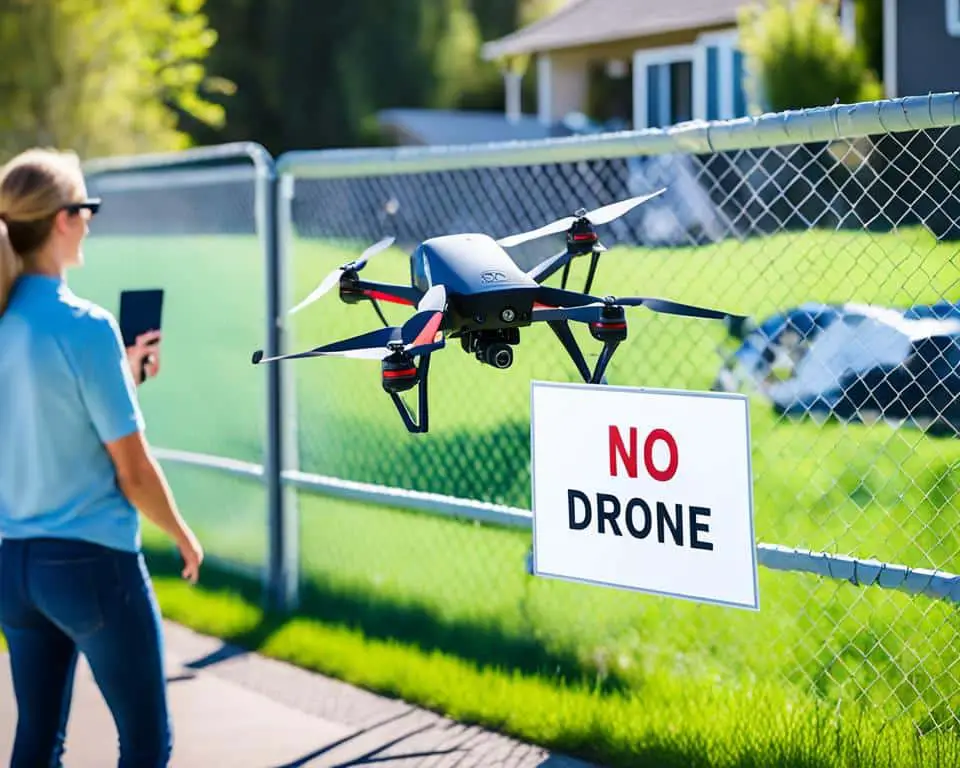
| Aspect of Drone Use | Community Impact | Best Practice |
|---|---|---|
| Aerial Trespassing | Can lead to disputes and privacy complaints | Know and adhere to local boundaries and property limits |
| Drone Surveillance | Boosts privacy concerns and potential for legal issues | Avoid capturing imaging on private property without consent |
| Operational Knowledge | Minimizes risks and enhances responsibility | Stay updated on regulations and pilot training |
| Homeowner’s Privacy | Protects the sanctity and security of personal property | Respect no-fly zones and seek permissions when needed |
| Ownership Boundaries | Defines physical and legal flight zones | Be conscious of altitude restrictions and local bylaws |
While technology progresses, so does the importance of understanding the ethical implications of operating a drone. Drone hobbyists and professionals alike have a shared responsibility to foster a cohabitational environment, where the rights to privacy and property are held in high regard, and where every flight is a testament to the conscientious spirit of modern UAV ownership.
Best Practices for Drone Pilots to Avoid Legal Issues
To safeguard against legal complications, drone pilots must exercise due diligence in their flight preparations and operational conduct. Adherence to best practices not only contributes to the safety of the skies but also ensures that pilots comply with pertinent laws and respect the rights of property owners. In this section, we delve into the steps pilots should take before, during, and after their flights to minimize risks and fly their drones responsibly.
Seeking Permission from Property Owners
Obtaining drone flight permission from property owners is a fundamental step for drone operators. This practice is crucial when planning to fly over private land as it not only demonstrates respect but also prevents potential legal disputes from arising. Building a rapport with the community and informing them of your intentions can go a long way towards fostering a positive drone-flying environment.
Conducting Pre-Flight Checks and Risk Assessments
Before taking to the skies, it is essential to engage in pre-flight procedures, which include examining the drone’s technical state and its surroundings. An effective risk assessment for drones should be conducted to identify and mitigate potential hazards that could arise during the flight. Checklists can be beneficial for ensuring no critical step is overlooked before liftoff.
Maintaining Visual Line of Sight and Altitude Limits
Once airborne, maintaining a visual line of sight with your drone is mandatory to ensure you can react to any unforeseen circumstances promptly. Additionally, pilots must abide by drone altitude restrictions to stay clear of manned aircraft and adhere to the FAA’s guidelines. Understanding and complying with these regulations will aid in maintaining the safety and legality of each flight.
Implementing these best practices is integral for any responsible drone pilot. The table below summarizes the recommended steps to take for safe and legal drone operations.
| Best Practice | Description | Benefits |
|---|---|---|
| Seeking Permission | Contacting property owners to request flight permission | Reduces legal risk and fosters community relations |
| Pre-Flight Checks | Performing thorough inspections and risk assessments | Identifies potential issues before takeoff, enhancing safety |
| Visual Line of Sight | Keeping the drone within eye range throughout the flight | Ensures immediate response to hazards or changing conditions |
| Altitude Adherence | Respecting vertical space limits, typically below 400 feet | Avoids interference with other airspace users and legal issues |
By incorporating these protocols into your routine, you can secure not only a safer flight experience but also a more amicable reception for drone technology within society.
Mitigating Risks: Insurance and Liability for Drone Operators
In the rapidly expanding world of Unmanned Aerial Vehicles (UAVs), controlling potential financial hazards is as crucial as mastering the controls of the drones themselves. Understanding and managing the risks through drone operator insurance and other protective measures can prevent severe monetary setbacks in the event of drone accidents or other liabilities. Let’s explore the crucial steps a drone pilot can take to ensure they’re adequately protected, promoting not only UAV operator accountability but also peace of mind while flying.
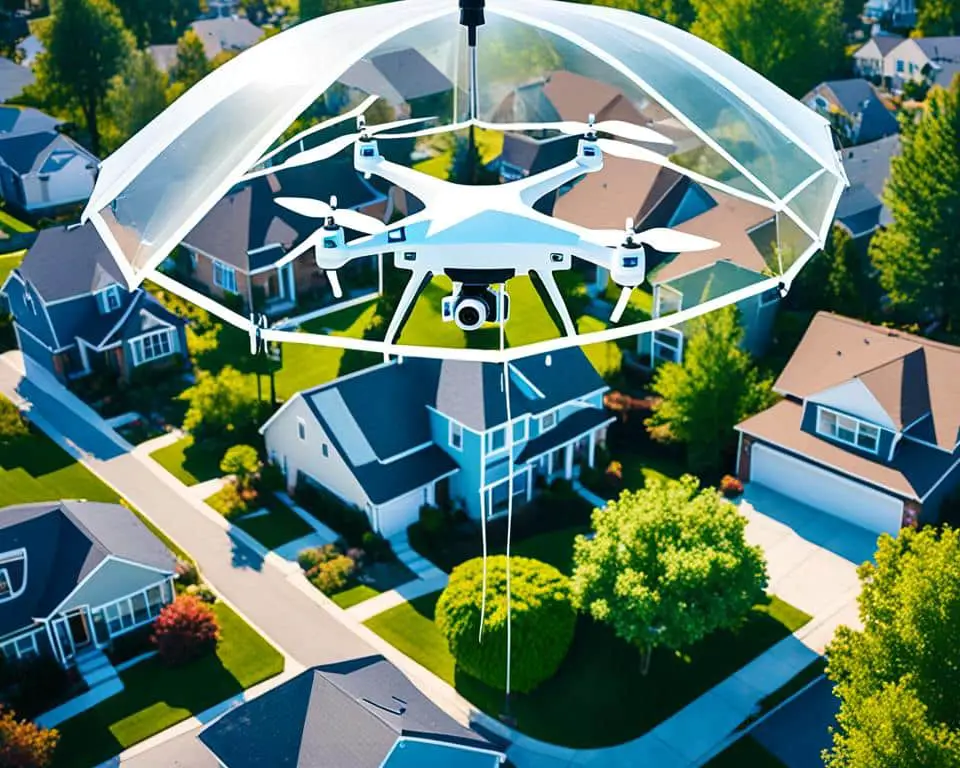
Importance of Drone Insurance for Recreational and Commercial Flyers
Whether you’re flying for fun or piloting for profit, obtaining suitable drone operator insurance is a wise decision. Insurance acts as a financial safety net, covering costs that may arise from incidents such as property damage or personal injury claims. For recreational users, insurance might be more about personal financial protection, whereas for commercial operators, it’s a cornerstone of professional responsibility and client trust.
Navigating Liability Issues in Case of Accidents or Damage
In the event of a drone accident, determining UAV liability is a complex process. Liability claims can surface from damage to property or personal injury, resulting from a drone’s operations. Pilots should be well-versed in the nuances of potential liabilities and how to respond appropriately. This includes knowing how to report an incident and cooperate with authorities and insurance providers to address claims and conduct thorough investigations.
The Role of Drone Registration in Liability and Accountability
Registering your drone with the Federal Aviation Administration (FAA) is a critical responsibility for UAV operators. Drone registration serves as an essential component of UAV operator accountability, linking a specific aircraft to an individual. This connection is particularly crucial in the aftermath of a drone-related incident, as it assists in the identification of the responsible party and enables appropriate legal actions if necessary.
| Aspect | Insurance Coverage | Importance |
|---|---|---|
| Personal Injury | Covers claims from injuries caused by drones | Protects against high costs of medical bills and legal actions |
| Property Damage | Compensates for damages to third-party property | Shields pilot’s personal assets from being used for restitution |
| Third-party Liability | Financial protection from damage or injury claims by others | Essential for both commercial operations and hobbyists |
| Registration Compliance | May provide support for administrative fines | Ensures legality of drone flights, reducing risk of penalties |
Certain savvy aerial navigators see insurance not only as an obligatory expense but as a strategic investment in the future of their drone endeavors. Drone insurance and attentiveness to liability encompass more than mere compliance; they embody the proactive approach necessary to soar confidently in the ever-changing skies of UAV regulation.
Conclusion
In the dynamic airspace shared by drones and the community, responsible drone flying rises as a banner under which hobbyists and professionals alike must rally. The discussions here present the invaluable notion that the thrills of UAV piloting are deeply entwined with the discipline of safely navigating drone laws. Piloting drones is not solely about the mastery of flight mechanics; it encompasses the broader scope of ethical stewardship and community-conscious drone use.
As operators, embedding UAV best practices into every flight plan fosters an environment where innovation and privacy coexist in harmony. This calls for a proactive drone operation mindset, one that anticipates the intersection of legislation and technology. Such foresight not only mitigates risks but also carves a path toward advancements in drone applications that respect both the law and community norms.
The pursuit of drone flight, hence, asks for more than technical skills; it beckons for a culture of respect, accountability, and communal regard. By fortifying our commitment to these principles, we ensure that our skies remain hospitable for the fascinating ventures that drones offer. As we collectively uphold these tenets, we can look forward to an era where responsible use of this incredible technology yields a shared benefit and joy for all within the tapestry of society.

